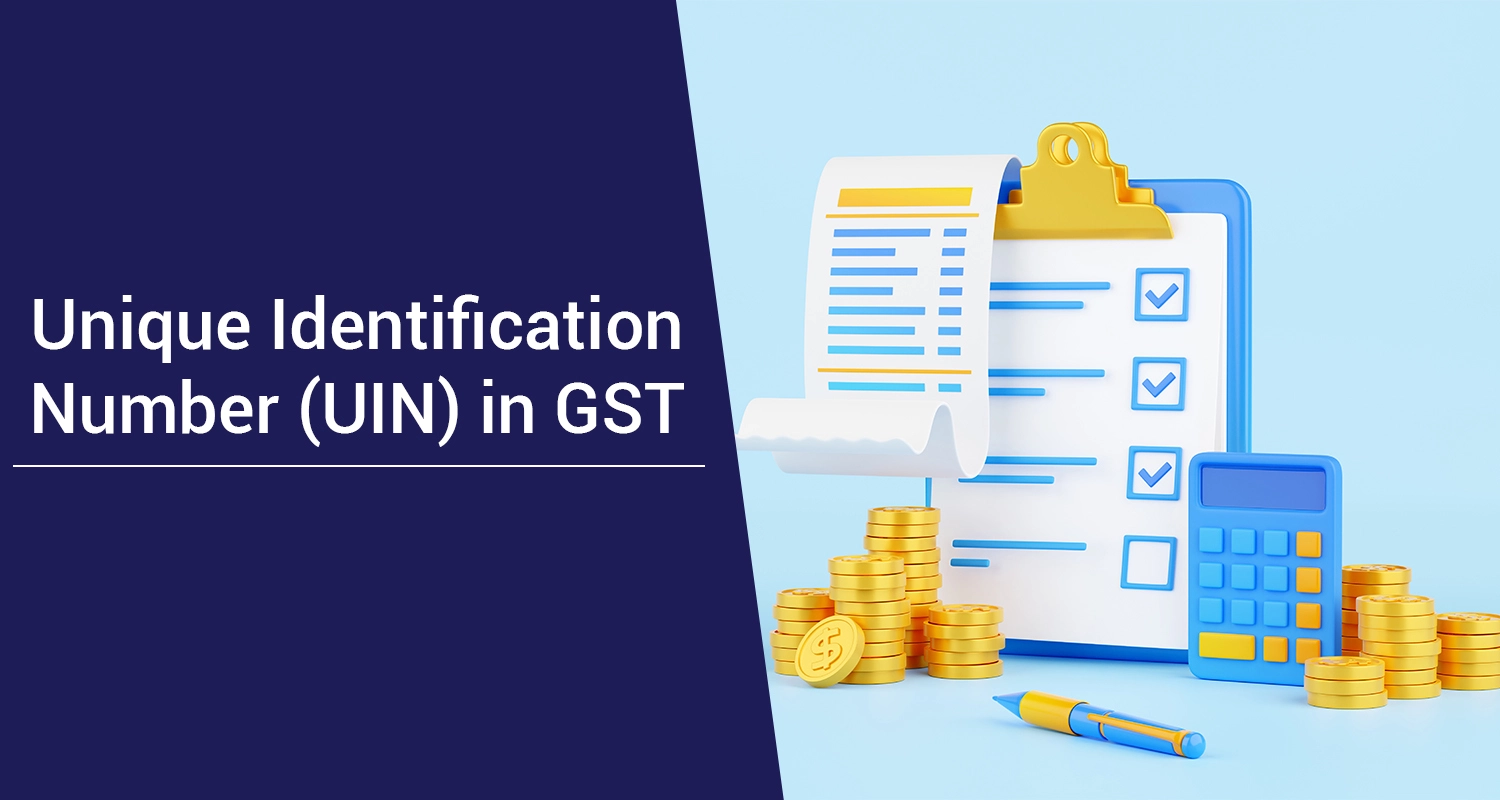Unique Identification Number (UIN) under GST

The Goods and Services Tax (GST) regime in India has transformed the country's taxation system significantly. One crucial aspect of GST is the concept of the UIN. UIN’s full form in GST is Unique Identification Number. This document explains the UIN in GST, its importance, who qualifies as a UIN holder, and how it operates within the GST framework.
What is UIN in GST?
The Unique Identification Number means: In GST it is a special classification designed primarily for diplomatic missions, consular bodies, and other notified international organizations, including those provided with the privilege of a tax refund. The UIN is not a typical GST registration number but serves a specific purpose under the GST law. Essentially, the UIN allows these entities to receive a refund of the taxes they pay on inward supplies (purchases).
Why is the UIN Important?
The primary purpose of the UIN is to facilitate tax refunds for entities that are exempt from paying taxes in India due to international agreements or diplomatic immunity. By issuing a UIN, the Indian government ensures that these organizations can conduct their activities without the burden of indirect taxes, thereby honoring international commitments and maintaining diplomatic relations.
Who is a UIN Holder in GST?
A UIN holder in GST can be any of the following entities:
- Foreign Diplomatic Missions and Embassies: These are international bodies operating within India, which are immune from local taxes under international treaties.
- United Nations and Other International Bodies: Organizations like the UN and its affiliates that are recognized and notified by the Indian government.
- Consulates and Other Recognized Foreign Bodies: Similar to embassies, these entities perform diplomatic functions and are granted tax exemption.
These entities must apply for a UIN to claim refunds on the GST they pay on purchases necessary for their official operations.
Sapna aapka. Business Loan Humara.
Apply NowHow to Apply for a UIN?
The application process for obtaining a UIN involves submitting the GST REG-13 form. This form must be filled out with the necessary details and submitted to the GST portal. Upon verification, the UIN is allotted to the applying entity. The following steps outline the process:
- Prepare Required Documents: Entities need to gather relevant documents such as a letter of authorization, identity proof of the authorized signatory, and details of the entity's activities.
- Fill GST REG-13 Form: This form requires information about the applicant entity, including its legal name, address, contact details, and the purpose of applying for the UIN.
- Submit the Application: The filled form, along with the required documents, is submitted on the GST portal.
- Verification and Approval: The GST authorities verify the application and documents. If everything is in order, the UIN is issued to the entity.
How Does the UIN Work?
Once a UIN is issued, the holder can use it to claim refunds on the GST paid for their purchases. The process involves:
- Making Purchases: The UIN holder makes purchases of goods or services required for their official use.
- Collecting Tax Invoices: The UIN holder must ensure that all purchases are accompanied by valid tax invoices showing the GST amount paid.
- Filing Refund Claims: Periodically, the UIN holder can file for a refund of the GST paid. This is done by submitting a refund application (GST RFD-10) and the necessary invoices and documents.
- Receiving Refunds: Upon verifying the refund application, the GST authorities process the refund, which is credited to the UIN holder's bank account. Learn more about how a letter of authorization for GST helps with refund claims.
Benefits of the UIN
The Unique Identification Number provides several benefits to the holder, including:
- Tax Exemption: UIN holders are exempt from the burden of GST, allowing them to operate more efficiently without incurring additional costs.
- Simplified Refund Process: The structured refund mechanism ensures that UIN holders can easily reclaim the taxes paid on their purchases.
- Support for International Relations: By honoring tax exemptions for diplomatic and international bodies, India strengthens its diplomatic ties and adheres to international agreements.
Challenges and Compliance
While the UIN system is designed to facilitate tax exemptions, it also comes with compliance requirements that UIN holders must adhere to. These include maintaining accurate records of all purchases and taxes paid, timely filing of refund claims, and cooperating with any audits or verifications conducted by GST authorities. Non-compliance can result in delays or denials of refunds, so UIN holders must stay informed and diligent in their record-keeping and filing processes.
Conclusion
The Unique Identification Number (UIN) in GST is a specialized provision that plays a vital role in India's taxation system, particularly for diplomatic missions and international organizations. By enabling these entities to claim refunds on the GST paid for their purchases, the UIN system ensures compliance with international agreements and supports diplomatic relations. Understanding the process of obtaining and using a UIN and the benefits and compliance requirements is essential for the entities eligible for this provision. Through the UIN, India continues to uphold its commitments to the international community while streamlining its tax administration.
The UIN framework reflects the balance between honoring international obligations and maintaining a robust tax system. As GST evolves, the mechanisms supporting UIN holders will likely continue to improve, ensuring India's tax administration remains effective and fair.
FAQS
Q1: What is UIN in GST, and who can apply for it?Ans: The Unique Identification Number (UIN) in GST is a special identification number allotted to foreign diplomatic missions, embassies, consulates, and certain international organizations operating in India. These entities are eligible to apply for a UIN to claim refunds on the GST they pay on their inward supplies (purchases) due to their tax-exempt status under international treaties and agreements.
Q2: How can a UIN holder claim refunds on the GST paid?Ans: A UIN holder can claim GST refunds by filing a refund application using form GST RFD-10 on the GST portal. The application must be accompanied by valid tax invoices for the purchases made. Upon submission, the GST authorities will verify the claim, and if everything is in order, the refund will be processed and credited to the UIN holder's bank account.
Q3: What documents are needed to apply for a UIN in GST?Ans: To apply for a UIN in GST, the following documents are typically required:
- A duly filled GST REG-13 form.
- A letter of authorization from the entity.
- Identity proof of the authorized signatory.
- Details about the entity’s operations and the purpose of applying for the UIN.
Ans: Yes, UIN holders must file their refund claims within six months from the last day of the quarter in which the supply was received. It is important to adhere to this timeline to ensure timely processing of refunds and avoid any potential delays.
Q5: Can a UIN be used for regular business operations like a GST registration number?Ans: No, a UIN is not intended for regular business operations and cannot be used like a typical GST registration number. It is specifically issued for entities like diplomatic missions, consulates, and certain international organizations to enable them to claim GST refunds on their purchases. Regular businesses must obtain a standard GSTIN (Goods and Services Tax Identification Number) for their operations.
Sapna aapka. Business Loan Humara.
Apply NowDisclaimer: The information contained in this post is for general information purposes only. IIFL Finance Limited (including its associates and affiliates) ("the Company") assumes no liability or responsibility for any errors or omissions in the contents of this post and under no circumstances shall the Company be liable for any damage, loss, injury or disappointment etc. suffered by any reader. All information in this post is provided "as is", with no guarantee of completeness, accuracy, timeliness or of the results etc. obtained from the use of this information, and without warranty of any kind, express or implied, including, but not limited to warranties of performance, merchantability and fitness for a particular purpose. Given the changing nature of laws, rules and regulations, there may be delays, omissions or inaccuracies in the information contained in this post. The information on this post is provided with the understanding that the Company is not herein engaged in rendering legal, accounting, tax, or other professional advice and services. As such, it should not be used as a substitute for consultation with professional accounting, tax, legal or other competent advisers. This post may contain views and opinions which are those of the authors and do not necessarily reflect the official policy or position of any other agency or organization. This post may also contain links to external websites that are not provided or maintained by or in any way affiliated with the Company and the Company does not guarantee the accuracy, relevance, timeliness, or completeness of any information on these external websites. Any/ all (Gold/ Personal/ Business) loan product specifications and information that maybe stated in this post are subject to change from time to time, readers are advised to reach out to the Company for current specifications of the said (Gold/ Personal/ Business) loan.



